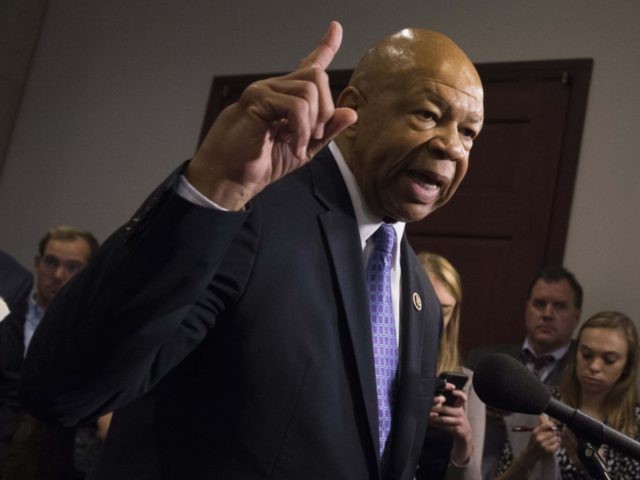Rep. Elijah Cummings (D-MD), who passed away on Thursday at the age of 68, will be fondly remembered as one of the collegial leaders on Capitol Hill, who forged personal friendships across party lines.
His legacy on the House Oversight Committee, however, is one of stark partisanship. In opposition, he defended abuses by President Barack Obama’s administration; when in the majority, he tried to damage President Donald Trump by any means necessary.
Cummings is remembered for his most recent fight with Trump, when the president called the congressman’s district in Baltimore “a disgusting, rat and rodent infested mess.”
Trump was reacting to Cummings’s own outbursts at then-Acting Secretary of Homeland Security Kevin K. McAleenan over the alleged mistreatment of migrant children in U.S. Border Patrol facilities at the southern border. Many Republicans felt Cummings went too far in his criticism.
Democrats called Trump’s tweet “racist,” pointing to the word “infested.” As Trump later noted, Cummings himself had used the term “drug-infested” to describe his own city in 1999, which remains one of America’s most troubled urban areas.
To conservatives, Cummings became a symbol of an entrenched Democratic political elite, who use racially gerrymandered districts to protect their gatekeeping roles and fail to improve the lives of their constituents.
Long before that, however, Cummings had made an enemy of the president (who was gracious on Thursday, calling Cummings a “highly respected political leader”).
As Breitbart News noted earlier this year: “What was once the ‘Committee on Oversight and Government Reform (OGR)’ is now the “Committee on Oversight and Reform (COR)’ — i.e. no ‘government.’ Cummings said the new name reflected the committee’s “true jurisdiction, which covers both government and the private sector.’ By ‘private sector,’ he meant ‘Trump.’
Cummings arguably abused his role to create elaborate show trials aimed at embarrassing the administration. The low point was a hearing in February featuring hapless former Trump lawyer Michael Cohen, who had already been convicted of lying to Congress and was on his way to federal prison. Though Cohen provided no evidence of “collusion” between Trump and Russia, his testimony was full of bitter personal denunciations of the president.
In April, Cummings wrote to Fox News demanding to know if it suppressed a story before the 2016 election about Trump’s alleged extramarital affairs — an accusation based on a dubious report in the liberal New Yorker. Cummings suggested Fox violated campaign finance laws by making an in-kind contribution to the Trump campaign by not running a story it could not prove. Effectively, he was demanding congressional oversight over Fox’s newsroom.
Meanwhile, Cummings appeared to have his own conflict of interest: his wife has a nonprofit group funded by business interests relevant to his committee, but refused to provide information about its funding, as required by law.
Cummings took a very different approach to oversight under the Obama administration. When the IRS scandal first broke, Cummings professed outrage that tax collectors had apparently singled out conservative groups for scrutiny. But he later declared the story “solved.”
It turned out that Cummings himself had urged the IRS to target one of the groups, True the Vote, which eventually won its court case against the government, and was awarded attorneys’ fees.
When a select committee attempted to find out the truth behind the Benghazi terror attack, Cummings emerged as Hillary Clinton’s number one defender. “Do we want to badger you over and over again until you do get so tired so we get the gotcha moment?” he asked Clinton during her testimony, almost apologizing for the fact she was being interviewed at all.
Cummings could be exceptionally gracious: he defended an emotional Rep. Mark Meadows (R-TX) from false accusations of racism hurled by Rep. Rashida Tlaib (D-MI) at the Michael Cohen hearing, for example.
Meadows remembered Cummings on Thursday: “There was no stronger advocate and no better friend than Elijah Cummings. I am heartbroken for his wonderful family and staff—please pray for them. I will miss him dearly.”
Yet despite his personal friendships with Republicans, Rep. Cummings helped make congressional oversight of the executive branch more partisan than it had been before, adding to the country’s growing political divisions.
Joel B. Pollak is Senior Editor-at-Large at Breitbart News. He earned an A.B. in Social Studies and Environmental Science and Public Policy from Harvard College, and a J.D. from Harvard Law School. He is a winner of the 2018 Robert Novak Journalism Alumni Fellowship. He is also the co-author of How Trump Won: The Inside Story of a Revolution, which is available from Regnery. Follow him on Twitter at @joelpollak.

COMMENTS
Please let us know if you're having issues with commenting.